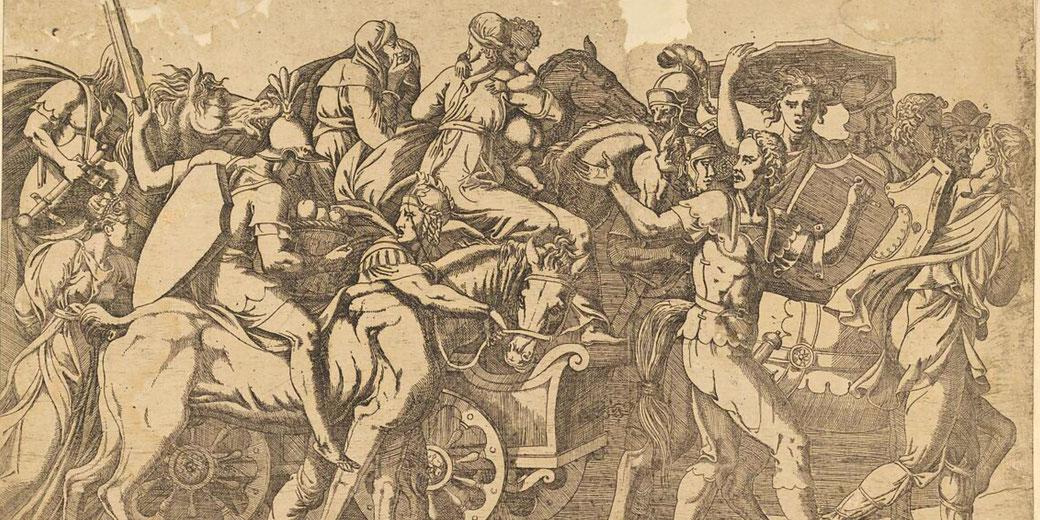How the ancient Romans declared war

It all started with a turf war, literally. Roman priests stood on sacred ground before they launched into battle and shouted at foreign enemies from across the border with the hope that someone would respond.
If nobody did, they threw a spear to say, “Alright, then!” Subtle? Not at all.
However, to the Romans, war was more than politics by other means. It was a set of religious ceremonies, complete with moral reasons and a dramatic show.
The strange religious ritual Rome used to declare war
It was the fetial priests that were the most important actors in formal rituals that led to the declaration of war in ancient Rome.
These priests were chosen from the patrician class. Their main task was to enforce Rome’s religious and legal rules by asking for the gods' approval before any fighting.
When they correctly followed the correct rites, they were meant to make sure Rome’s wars were considered ‘right’ and appropriately ‘sacred’.
In later years of the Empire, leaders often ignored these traditions for more practical, political reasons.
Even so, the memory of those rites informed later accounts of Roman warfare.
According to Livy, the first time Rome used the fetial rites to declare war was during its conflict with Fidenae, a city near the Tiber River, in the 7th century BCE.
One of the duties of the fetial priests was known as the clarigatio, an official demand for repayment presented to the enemy.
Specifically, this ritual set formal steps before any conflict began.
At the start of the ritual, the fetial priests chose one of their number that would be called the pater patratus.
This priest acted as Rome’s representative and traveled to the enemy’s territory.
Once there, he stated Rome’s complaints and made the clarigatio. If the enemy refused to meet the demand.
After a waiting period of 33 days, the priests returned to Rome to continue with the next steps of the ritual.
What role did the Roman Senate play in declaring war?
The Senate was Rome’s main decision-making group, whose members discussed and approved military actions.
Senators held long discussions about the reasons and possible results of going to war before voting on whether to proceed.
This process made sure the decision had the support of Rome’s leading figures and, as such, it was not taken lightly.
When the Senate approved the war, the army generals, known as consuls, and their sub-commanders, known as tribunes, received the authority to act.
After that approval, they moved to gather legions and prepare for the upcoming campaign.
The two consuls were elected every year, and they held the highest military power in Rome and the unique authority to lead the legions.
These two men then gathered the soldiers and prepared for the upcoming war.
The formal declaration of war
After the Senate gave its approval, the next step was to inform the enemy and the people of Rome.
At the Temple of Bellona, one of a number of Roman gods linked to war, the fetial priests held a formal ceremony by throwing a spear into a piece of land set aside to represent enemy soil.
This was meant to show Rome’s intent before both the gods and its people.
During the ceremony, the fetial priests asked the gods for support in the coming fight.
This step was important for gaining the gods’ support and keeping the people’s confidence strong.
Once this rite was complete, the war was officially declared. Plans for battle could begin.
How Rome mobilized its men
After the formal declaration, public meetings took place in places like the Forum informed the citizens of the decision and its reasons.
Rome also sent messengers to the enemy’s main city to deliver the formal declaration.
However, the priests stayed involved during the war by leading sacrifices and interpreting omens, actions that reinforced Rome’s higher moral standing.
These activities were thought to keep the gods on Rome’s side and support Rome’s moral position.
Also, the priests sometimes joined Roman generals on the battlefield to perform these rites, which was a way to constantly stress the sacred nature of Roman warfare.
What do you need help with?
Download ready-to-use digital learning resources
Copyright © History Skills 2014-2025.
Contact via email
With the exception of links to external sites, some historical sources and extracts from specific publications, all content on this website is copyrighted by History Skills. This content may not be copied, republished or redistributed without written permission from the website creator. Please use the Contact page to obtain relevant permission.





